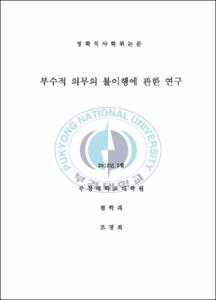부수적 의무의 불이행
- Alternative Title
- A Study on the non-performance of Subsidiary Obligation
- Abstract
- A Study on the non-performance of Subsidiary Obligation
Gyeong Hui Jo
Department of Law, The Graduate School,
Pukyong National University
Abstract
In principle of 'freedom of contract', a party or parties in the contract acquire(s) certain rights according to the conclusion of the contract, and along with this, a party is under different obligations to do depending on the contents agreed with the other party or the provisions of the law. Since a party or parties' intention or purport is an important part in the agreement, it is necessary to figure out the contents of each party's debt and how much it may have an influence on the achievement of the contract to some extent to determine whether its subsequent payments are made properly.
Meanwhile, if payments are not made properly according to the contents of debts, a debtor is obliged to be responsible for a penalty under certain conditions, and thus legal remedy means against non-performance occurs to the other party. Such remedy means of non-performance typically includes two methods: the one is to get supplemented about the damages caused by the non-performance; the other is to cancel the contract and then return to the point of time when the contract did not occur in order to get out of the contract. Damages compensation for the damages caused by the nonperfomance is acknowledged, but rescission of contract is partially acknowledged under certain cases. To this, both doctrines and precedents divide main obligation and subsidiary obligation as a means to determine the occurrence of rescission of contract. Therefore, main obligation and subsidiary obligation will be discussed separately, and particularly for subsidiary debt, as it is mainly discussed in case of violation of subsidiary obligation, subsidiary obligation will be intensely focused on.
However, many precedents have acknowledged the 'rescission of contract', in relation to the nonfulfilment of subsidiary obligation seemingly, judging like this: "It is inevitable to achieve its goal, and if it isn't fulfilled, the purpose of contract is not fulfilled, and thus it is a main debt that is enough to be considered that the party or parties did not enter into a contract." Therefore, when assessing the effect of non-performance, it must be determined by the party's rational decision making which was expressed when making a contract regardless of the counterpart's independent value or appeared evident objectively from the situation at the time, and various matters such as content, purpose, and consequences as a result of breach of contract should be considered. Therefore it is concluded that subsidiary obligation can be acknowledged as main obligation in some specific cases. In relation to this, discussions on the occurrence of the right to cancel as an effect of nonfulfilment of subsidiary obligation should be conducted.
Meanwhile, protection obligation is discussed under the influence of Germany. There is nothing to discuss the recognition of the claim of the damage by judging that nonfulfilment of subsidiary obligation is non-performance in the contract, but what is noteworthy in the discussion of protection obligation apart from the subsidiary obligation that substantially supports the realization of benefits obligation derived from benefits obligation is on the legal status of protection obligation. In other words, the key point is whether the nonfulfilment of protection obligation belongs to the area of non-performance that produces damages compensation persuant to Civil Code Section 390. In relation to this, the background of protection obligation and its legal nature will be discussed and the legal status of protection obligation will also be conversed.
Therefore, this study divides subsidiary obligation and main obligation and makes both the concepts more clarified to discuss whether rescission of contract in relation to the nonfulfilment of subsidiary obligation are acknowledged, and additionally legal nature of protection obligation will be examined and finally, whether it will be actually included in the area of non-performance will be reviewed.
- Issued Date
- 2012
- Awarded Date
- 2012. 2
- Type
- Dissertation
- Publisher
- 부경대학교 대학원
- Department
- 대학원 법학과
- Advisor
- 고명식
- Table Of Contents
- < 목 차 >
Abstract
제 1 장 서론 1
제 1 절 연구의 목적 1
제 2 절 연구의 범위와 방법 3
제 2 장 의무의 구조 5
제 1 절 서 설 5
제 2 절 급부의무와 부수적 의무 7
Ⅰ. 서 7
Ⅱ. 독일에서의 논의 8
1. 급부의무 9
2. 부수적 의무 10
Ⅲ. 급부의무와 부수적 의무의 구분 21
1. 급부의무 21
2. 부수적 의무 26
3. 급부의무와 부수적 의무의 차이점 31
Ⅳ. 의무의 구분에 대한 비판적 견해 34
제 3 절 부수적 의무의 내용 35
Ⅰ. 서 35
Ⅱ. 부수적 의무의 구성 36
1. 협의의 부수적 의무 37
2. 보호의무 37
3. 안전배려의무 43
Ⅲ. 소결 47
제 3 장 부수적 의무의 불이행과 계약해제 48
제 1 절 서 설 48
제 2 절 해제권 발생의 인정여부 50
Ⅰ. 서 50
Ⅱ. 외국의 입법례 52
1. 프랑스민법 52
2. 독일민법 54
3. 국제적인 통일법 55
Ⅲ. 학설의 대립 57
Ⅳ. 판례의 태도 58
1. 해제권 발생을 부정한 경우 59
2. 해제권 발생을 인정한 경우 63
Ⅴ. 소결 64
제 4 장 부수적 의무의 불이행과 손해배상 67
제 1 절 서 설 67
제 2 절 부수적 의무의 불이행과 손해배상에 관한 논의 69
Ⅰ. 서 69
Ⅱ. 외국의 입법례 70
1. 독일의 경우 70
2. CISG의 경우 73
3. PECL의 경우 74
Ⅲ. 학설의 대립 75
1. 협의의 부수적 의무 75
2. 보호의무 75
3. 안전배려의무 84
Ⅳ. 판례의 태도 86
1. 불법행위책임을 인정하는 경우 87
2. 채무불이행책임을 인정하는 경우 88
Ⅵ. 소결 91
제 5 장 결론 94
< 참고 문헌 >
- Degree
- Master
- Files in This Item:
-
-
Download
 부수적 의무의 불이행.pdf
기타 데이터 / 888.1 kB / Adobe PDF
부수적 의무의 불이행.pdf
기타 데이터 / 888.1 kB / Adobe PDF
-
Items in Repository are protected by copyright, with all rights reserved, unless otherwise indicated.